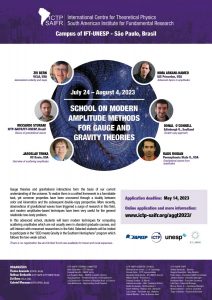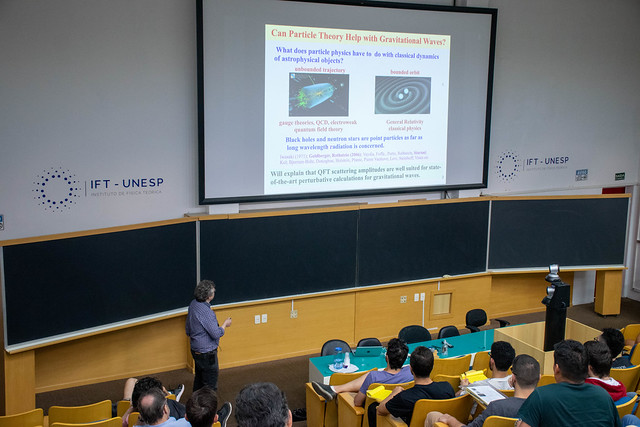School on Modern Amplitude Methods for Gauge and Gravity Theories
July 24 – August 4, 2023
São Paulo, Brazil
ICTP-SAIFR/IFT-UNESP

- Home
- Lecturers
- Reading material
- Registration
- Program
- Videos and Files
- Photos
- Additional Information
Home
Gauge theories and gravitational interactions form the basis of our current understanding of the universe. To realize them in a unified framework is a formidable task, yet common properties have been uncovered through a duality between color and kinematics and the subsequent double-copy perspective. More recently, observations of gravitational waves have triggered a surge of research in this field, and modern amplitudes-based techniques have been very useful for the general relativistic two-body problem.
In this advanced school, students will learn modern techniques for computing scattering amplitudes which are not usually seen in standard graduate courses, and will interact with renowned researchers in the field. Selected students will be invited to participate in the “Gravitational Waves meet Amplitudes in the Southern Hemisphere” program which follows the two-week school.
There is no registration fee and limited funds are available for travel and local expenses.
Organizers:
- Thales Azevedo (IF/UFRJ, Brazil)
- Nathan Berkovits (ICTP-SAIFR & IFT/UNESP, Brazil)
- Zvi Bern (UCLA, USA)
- Gabriel Menezes (DEFIS/UFRRJ, Brazil)
Satisfaction Survey: Here
Lecturers
- Zvi Bern (UCLA, USA): Generalized unitarity and loops
- Riccardo Sturani (ICTP-SAIFR/IFT-UNESP, Brazil): Basics of gravitational waves
- Jaroslav Trnka (UC Davis, USA): Overview of scattering amplitudes
- Nima Arkani-Hamed (IAS Princeton, USA): Advanced topics in amplitudes
- Donal O´Connell (Edinburgh University, Scotland): Double copy approach
- Radu Roiban (Pennsylvania State University, USA): Gravitational waves from amplitudes
List of Participants: Updated on July 31, 2023
Reading material
Week 1:
L. J. Dixon, “Calculating scattering amplitudes efficiently,” [arXiv:hep-ph/9601359 [hep-ph]].
Z. Bern, L. J. Dixon and D. A. Kosower, “Progress in one loop QCD computations,” [arXiv:hep-ph/9602280 [hep-ph]].
Z. Bern and Y. t. Huang, “Basics of Generalized Unitarity,” [arXiv:1103.1869 [hep-th]].
Z. Bern, J. J. Carrasco, M. Chiodaroli, H. Johansson and R. Roiban, “The Duality Between Color and Kinematics and its Applications,” [arXiv:1909.01358 [hep-th]].
Week 2:
Radu Roiban: for a “big picture” snapshot as of the middle of last year, I would suggest https://arxiv.org/abs/2204.
for a slightly more technical one https://arxiv.org/abs/2203.
For explicit use of some of the methods that I will cover, I would suggest looking over
https://arxiv.org/abs/1808.
Abstract:
Recent development revealed a close connection between a certain classical limit of scattering amplitudes in quantum field theory and classical interactions of massive bodies. In these lectures we will review this connection for conservative gravitational dynamics. Topics that will be discussed are:
– perturbative expansions of two-body interactions
– classical interaction potential from scattering amplitudes in nonrelativistic quantum mechanics beyond leading order
– classical regime of scattering amplitudes — tree level
– Hamiltonian and radial action: general picture
– tree-level/leading order/1PM/1PL illustration
– classical regime of scattering amplitudes — loop level: identification of the relevant contributions vs generalized unitarity
– one-loop/next-to-leading order/2PM illustration
– aspects of resummation of the radial action
– comments on beyond 2PM
– other effects — tidal, spin (if time allows)
Registration
Program
School program: PDF updated on July 31, 2023
Videos and Files
2023-07-24
-
09:30 - Jaroslav Trnka (UC Davis, USA):
Overview of scattering amplitudes - Class 1 of 5
-
11:15 - Riccardo Sturani (ICTP-SAIFR/IFT-UNESP, Brazil):
Basics of gravitational waves - Class 1 of 5
-
14:00 - Jaroslav Trnka (UC Davis, USA):
Overview of scattering amplitudes - Class 2 of 5
-
09:30 - Jaroslav Trnka (UC Davis, USA):
Overview of scattering amplitudes - Class 3 of 5
-
11:15 - Riccardo Sturani (ICTP-SAIFR/IFT-UNESP, Brazil):
Basics of gravitational waves - Class 2 of 5
-
14:00 - Zvi Bern (UCLA, USA):
Generalized unitarity and loops - Class 1 of 5
-
09:30 - Zvi Bern (UCLA, USA):
Generalized unitarity and loops - Class 2 of 5
-
11:15 - Riccardo Sturani (ICTP-SAIFR/IFT-UNESP, Brazil):
Basics of gravitational waves - Class 3 of 5
- 14:00 - Zvi Bern (UCLA): From Quantum Scattering Amplitudes to Gravitational Waves
-
15:45 - Jaroslav Trnka (UC Davis, USA):
Overview of scattering amplitudes - Class 4 of 5
-
09:30 - Jaroslav Trnka (UC Davis, USA):
Overview of scattering amplitudes - Class 5 of 5
-
11:15 - Riccardo Sturani (ICTP-SAIFR/IFT-UNESP, Brazil):
Basics of gravitational waves - Class 4 of 5
-
14:00 - Zvi Bern (UCLA, USA):
Generalized unitarity and loops - Class 3 of 5
-
09:30 - Zvi Bern (UCLA, USA):
Generalized unitarity and loops - Class 4 of 5
-
11:15 - Riccardo Sturani (ICTP-SAIFR/IFT-UNESP, Brazil):
Basics of gravitational waves - Class 5 of 5
-
14:00 - Zvi Bern (UCLA, USA):
Generalized unitarity and loops - Class 5 of 5
-
09:30 - Donal O´Connell (Edinburgh University, Scotland):
Double copy approach - Class 1 of 5
-
11:15 - Radu Roiban (Pennsylvania State University, USA):
Gravitational waves from amplitudes - Class 1 of 5
-
14:00 - Donal O´Connell (Edinburgh University, Scotland):
Double copy approach - Class 2 of 5
-
09:30 - Radu Roiban (Pennsylvania State University, USA):
Gravitational waves from amplitudes - Class 2 of 5
-
11:15 - Donal O´Connell (Edinburgh University, Scotland):
Double copy approach - Class 3 of 5
-
14:00 - Nima Arkani-Hamed (IAS Princeton, USA):
Advanced topics in amplitudes - Class 1 of 5
-
15:45 - Nima Arkani-Hamed (IAS Princeton, USA):
Advanced topics in amplitudes - Class 2 of 5
-
09:30 - Nima Arkani-Hamed (IAS Princeton, USA):
Advanced topics in amplitudes - Class 3 of 5
-
11:15 - Nima Arkani-Hamed (IAS Princeton, USA):
Advanced topics in amplitudes - Class 4 of 5
- 14:00 - Nima Arkani-Hamed (IAS Princeton): Big New Accelerators and the Future of Particle Physics
-
15:45 - Nima Arkani-Hamed (IAS Princeton, USA):
Advanced topics in amplitudes - Class 5 of 5
-
09:30 - Radu Roiban (Pennsylvania State University, USA):
Gravitational waves from amplitudes - Class 3 of 5
-
11:15 - Donal O´Connell (Edinburgh University, Scotland):
Double copy approach - Class 4 of 5
-
14:00 - Radu Roiban and Donal O´Connell ( School on Modern Amplitude Methods for Gauge and Gravity Theories):
Gravitational waves from amplitudes - Extra Class
-
09:30 - Radu Roiban (Pennsylvania State University, USA):
Gravitational waves from amplitudes - Class 4 of 5
-
11:15 - Donal O´Connell (Edinburgh University, Scotland):
Double copy approach - Class 5 of 5
-
14:00 - Radu Roiban (Pennsylvania State University, USA):
Gravitational waves from amplitudes - Class 5 of 5
asdasdasd
Photos
Additional Information
School Registration: ALL participants should register. The registration will be on July 24 (Monday) at the Institute from 08:30 am to 09:30 am.
BOARDING PASS: All participants, whose travel has been provided or will be reimbursed by ICTP-SAIFR, should bring the boarding pass upon registration. The return boarding pass (PDF, if online check-in, scan or picture, if physical) should be sent to secretary@ictp-saifr.org by e-mail.
COVID-19: Brazilians and foreigners no longer have to present proof of vaccination before entering the country.
Visa information: Nationals from several countries in Latin America and Europe are exempt from tourist visa. Nationals from Australia, Canada, Japan and USA are exempt from tourist visa until October 1st, 2023. Please check here which nationals need a tourist visa to enter Brazil.
Accommodation: Participants, whose accommodation will be provided by the institute, will stay at The Universe Flat. Hotel recommendations are available here
How to reach the Institute: The school will be held at ICTP South American Institute, located at IFT-UNESP, which is across the street from a major bus and subway terminal (Terminal Barra Funda). The address which is closer to the entrance of the IFT-UNESP building is R. Jornalista Aloysio Biondi, 120 – Barra Funda, São Paulo. The easiest way to reach us is by subway or bus, please find instructions here.

